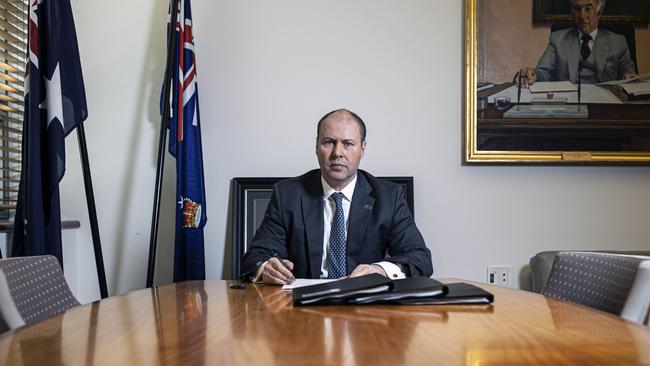
Despite the remarkable level of funding at hand for Treasurer Josh Frydenberg — the consensus is a $210bn deficit, nearly triple what we might have assumed pre-COVID — investors should not expect a silver bullet this time round.
That’s because a lot of money in this budget is going to be soaked up keeping things as they are: cushioning unemployment and underpinning the ability of banks to have up to one in 10 borrowers deferring loan payments.
Similarly, one-off payments to pensioners and low income earners are now baked into expectations. So too are moves such as having a single default scheme to avoid multiple super accounts.
The daily drip feed of budget news from Treasury has already revealed how the government will offer targeted help to manufacturers, airlines and agricultural workers. Such initiatives will be very welcome in those sectors but for investors they are not going to make a big difference any time soon. These are routine budget moves; investors are looking for much bigger fish to fry — they want to see substantial changes in personal tax, super and market access.
So far it looks like such substantial changes are coming down the track — the big question will be just how soon the Morrison government can practically introduce such moves.
For example, the single biggest issue for investors is not potential business tax cuts (which might give a sugar hit to listed stocks), but whether personal tax cuts will be brought forward.
Under the current plans the personal tax reform agenda is effectively miles away: the first moves are not due until July 2022. The serious changes are not due until July 1, 2024 — that’s when we will see the removal of the 37 per cent tax bracket as the majority of Australians will fall into a tax band of 32.5 per cent on taxable income between $45,000 and $200,000. In turn the 45 per cent band would move up to a new threshold of $200,000 from $180.000.
If the Treasurer is to move the personal tax cut timetable forward, as is expected, the entire trainload of future tax changes might come closer to us — perhaps beginning on July 1 2021.
Such a change will get headlines on budget night, but July 1 is a long way from October 2020, while wider changes which may move to July 1, 2023 are hardly much more immediately useful than something that was due a year later.
Yet the realistic chances of any government bringing in tax changes before July 1 are slim indeed. Not impossible, but quite unlikely because the sheer logistics of doing that in the current environment. It might simply overload the system which is already struggling with the JobKeeper and JobSeeker programs.
To do something genuinely momentous Frydenberg and his team would have to go “off the script”. If they do so, then just about anything is on the table from the wildest rumours in recent weeks (death taxes anyone?) to an overhaul of the capital gains tax system.
For investors, the most important potential changes expected in superannuation might also be viewed with some caution. If the government freezes or drops entirely the commitment to move the super guarantee contribution from 9.5 to 12 per cent in the years ahead, it will resolve a highly politicised battle.
But most active investors invariably make sure to take full advantage of tax breaks in super — particularly the $25,000 per annum pre-tax (concessional) amount you can put into a fund each year. Investors aim to maximise the super contribution rules, they do not need any compulsion to do so. Here are some of the key issues that just might appear in the final draft.
● An acceleration in the personal tax cuts timetable — but when do they kick in? July 2021 rather than July 2022 is a very modest goal.
● A significant widening of childcare subsidy allowances — some powerful groups have been lobbying for this change and their timing is spot on.
● An expansion of the First Home Super Saver scheme to allow compulsory super contributions along with voluntary super contributions.
An overhaul of the so-called “catch up” allowances in super contributions that may move the system towards a lifetime cap rather than rolling allowances, along with some reform of “spousal equalisation” in terms of contributions.
● In tandem with a potential freezing of the super guarantee contribution rates, there could be a lifting of the pre-tax (concessional) rate of $25,000 per annum — the threshold has been constantly moved up and down over the last decade, so another change would not cause undue alarm.
● More incentives to get people working later in life, such as a full repeal of the “work tests”.
● In terms of revenue raising, don’t be surprised if the government takes the opportunity to introduce some unpopular changes that may get through with less than the usual drama under these extraordinary conditions.
● The discount of 50 per cent on capital gains tax allowed to investors who have held the assets for more than a year is said to be under review, and the discount could be reduced.
● A reassessment of Division 293 that harmonises the threshold with the soon to be reset top personal tax threshold.







The forthcoming federal budget will be momentous, highly influential and a milestone in the very manner in which we expect to be governed. But what will it mean for investors?